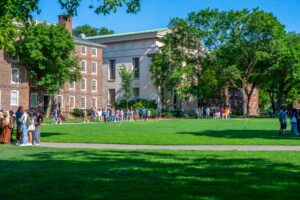Early decision applications were due earlier this month, and now students wait with bated breath to see what schools will say. While we all hope to hear the best, that sadly doesn’t always happen. Many students will get the news they eagerly long to hear, but many more will get rejected.
What should these students do? Where do you go from here? Are their dreams of college forever shattered? In this article, we’ll discuss what you should do when you get rejected from a school you applied to ED, the steps you can take, and how you can ensure you’ll still have a wonderful college experience. Let’s get started!
How Rejected Are You?
Not all students who fail to attain admission are rejected outright. Some are waitlisted, and some are deferred to the regular decision admissions round. We suggest you read our articles on those subjects if either of these applies to you. While this article may still be helpful to you, those articles contain advice we have specifically tailored to help guide students through those situations.
Step 1: Take Stock of Your Situation
You are only allowed to apply to a single school ED, but many students apply early action at the same time, especially to public schools. If you did this, you are already in a good place. EA applications may take longer to process, but you’ll still hear back before regular decision deadlines arrive. This isn’t to say you’re done necessarily, merely that you have less work ahead of you.
If you only applied to one school early, then you have more work ahead of you. Your road is not impossible, but we want to let you know this now. Don’t worry, we’ll give you some tips to make your workload more manageable, but there is work ahead.
Finally, take a moment to process the rejection, and make sure you’re ok. Rejection often stings, especially when it comes from your first-choice school. You poured your heart and soul into the application, and sent it off with high hopes, only to have them dashed. Many students feel like this is a personal rebuke; and that by rejecting them the school is saying that they are not good enough.
This is not true. Many colleges would love to admit all of the students who apply, most of whom are highly qualified and enthusiastic scholars, with bright futures ahead of them. The sad truth of college admissions is that there are more qualified students who apply than there are spaces at any given institution.
Many students are rejected not because they aren’t “good enough,” but instead because admissions officers believe they would succeed better at another institution. This is often hard for students to hear, but a rejection is not a sign you aren’t a good student, and it doesn’t mean your college dreams are dead. All it means is the school in question doesn’t think you and they are the best fit.
It is ok to take some time to process this and your feelings surrounding it. If you find that it’s negatively impacting your ambitions or your college ambitions, we suggest you talk to a professional. There is no shame in seeking help if you need it.

Step 2: Consider Your College List
If you’ve already applied to many schools EA, then this will be easier for you. You hopefully have a healthy mix of reach, target, and safety schools; if not, consider further applications which will fill those needs.
If your ED application was the only one you did, then you have a bit more work to do. Begin by building a balanced college list; for advice on doing so, see our article here. You may already have ideas for backup schools or will need to spend time researching your options. Don’t take too long with this step, as you still have much to do.
Thanks to how the Common App works, you’ll only need to do the parts of the application-specific to each new school. Unfortunately, depending on which schools you’re applying to, this can mean writing up to four new essays for each school.
If, however, you already wrote supplemental essays for your first school, then you can reuse them easily. There are only so many supplemental questions schools can ask, and we outline how to reuse essays in our article here. (If you applied to UChicago early, then that’s going to be harder, but this will work well for most schools). Even if you did not write supplemental essays for your ED application, with careful work, you will be able to get a lot of use out of only a few narratives.
Step 3: Consider ED II
We already wrote an article covering Early Decision II, but it’s worth discussing again briefly here.
ED II is a relatively recent development in college admissions. It works similarly to ED, in that it is a binding commitment to attend a school if you are accepted, but is due at the same time as regular decision applications. This provides a slight admissions boost, less so than the one offered by applying ED, but still noticeable.
If you have a clear second choice school, and they offer ED II, we recommend you pursue it. This is not a major boost to your application chances, but it does help some, and every little bit counts. Not all schools offer ED II, however, so this may not apply to you.
You can only apply to a single school ED II (just like ED), so if you do so, make sure you want to attend the school in question. Don’t apply ED II just to do so; only do this if you are seeking to improve your admissions chances to a school you are eager to attend. You don’t want to be locked into attending a school you don’t particularly care for.
Step 4: Revisit Your Personal Statement
While your personal statement is probably not the reason you got rejected, if you have the time, it can still be worth revisiting. You should not throw the whole thing out and start from scratch, but you should reexamine what it says about who you are. Read through your personal statement with fresh eyes, and then answer the following questions:
- What is the main message of the essay?
- What does the reader learn about your values?
- What does the reader learn about you as a person?
- Do you enjoy the depiction of yourself in the essay?
If you are unsatisfied with the answers to these questions, then you may find value in reworking your personal statement. We put this step last as it should not be your first priority, but can be an advantageous use of time. Each student is different of course, and you should take the course of action which best improves your college odds.
When revising your personal statement, begin with larger edits, then move down to the details. Start with the tone, structure, and message of the essay. Once you are satisfied with these, go down to the level of paragraphs, then sentences, and only then work on the individual word choice.
The reason for editing in this manner is to prevent doing extra work. Changing a piece of the essay with a greater scope impacts everything, while more granular changes are often erased by grander ones. You should always strive to work efficiently, and that is why we edit our essays in this way.
Final Thoughts
Rejection can feel crushing, and like the end of all of your college dreams. That is the benefit of applying ED, however; you still have time to try again, and a single rejection does not have to spell the doom of your collegiate ambitions. We hope that this article will help you on your own quest for higher education, and show you the steps you need to take to get there.
Of course, college applications can be difficult, even for the brightest students. If you want help implementing what we’ve written here, or want expert eyes to review your own ED application, and see what may have gone wrong, don’t hesitate to schedule a free consultation with us. We have a long experience helping students get into their dream schools, and are always happy to hear from you.








